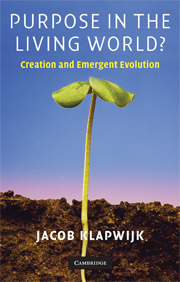Book contents
- Frontmatter
- Contents
- List of figures
- Preface
- Introduction
- 1 Does life on earth have a purpose?
- 2 Creationism, Intelligent Design, and Augustine's idea of time
- 3 Darwin, neo-Darwinism, and the naturalistic continuity claim
- 4 Miller's pre-biotic broth and the premises of evolutionism
- 5 A cold shudder along Darwin's back
- 6 The emergence theory of Morgan and Alexander
- 7 Luctor et emergo: what is emergent evolution?
- 8 Toward a general theory of emergent evolution
- 9 Hominization and the philosophy of mind
- 10 Augustinian faith and evolutionary science
- 11 The organism is a whole. The world is a habitat
- 12 The slumbering temptation of essentialism
- 13 Questions surrounding the emergence process
- 14 Enkapsis in nature. Is there an Omega point?
- Bibliography
- Index
3 - Darwin, neo-Darwinism, and the naturalistic continuity claim
Published online by Cambridge University Press: 05 June 2012
- Frontmatter
- Contents
- List of figures
- Preface
- Introduction
- 1 Does life on earth have a purpose?
- 2 Creationism, Intelligent Design, and Augustine's idea of time
- 3 Darwin, neo-Darwinism, and the naturalistic continuity claim
- 4 Miller's pre-biotic broth and the premises of evolutionism
- 5 A cold shudder along Darwin's back
- 6 The emergence theory of Morgan and Alexander
- 7 Luctor et emergo: what is emergent evolution?
- 8 Toward a general theory of emergent evolution
- 9 Hominization and the philosophy of mind
- 10 Augustinian faith and evolutionary science
- 11 The organism is a whole. The world is a habitat
- 12 The slumbering temptation of essentialism
- 13 Questions surrounding the emergence process
- 14 Enkapsis in nature. Is there an Omega point?
- Bibliography
- Index
Summary
In the preceding chapter we explored the world of religion. We requested attention to the narrative of creation and to the practical function that this story has in the life of believers and in the liturgy of the church. We also paused to examine the intellectualistic interpretation that the creation message has received in creationist circles.
In this chapter we turn our sights to the world of science, particularly of evolutionary science. Can the belief that God created the world, including living organisms, be harmonized with the scientific idea that life on earth developed through natural selection, and as such represents an evolutionary continuum? First I recapitulate a number of key points in Darwin's theory (section 1). Then I refer to neo-Darwinism or the modern synthesis of evolutionary theory and genetics; at the same time I introduce a sharp distinction between the theory of evolution and the ideological claims of so-called evolutionism (section 2). This distinction will lead us into a discussion of the naturalistic implications of evolutionism (section 3). We conclude this chapter with a critical analysis of the continuity postulate and the reducibility postulate that are both presupposed in the evolutionistic ideology (section 4).
DARWIN'S THEORY OF EVOLUTION: THE CVST ALGORITHM
The theory of the origin of biological species by selective natural breeding and hereditary transmission is a monumental one. One could see it as one of the greatest scientific breakthroughs of the nineteenth century.
- Type
- Chapter
- Information
- Purpose in the Living World?Creation and Emergent Evolution, pp. 37 - 52Publisher: Cambridge University PressPrint publication year: 2008

